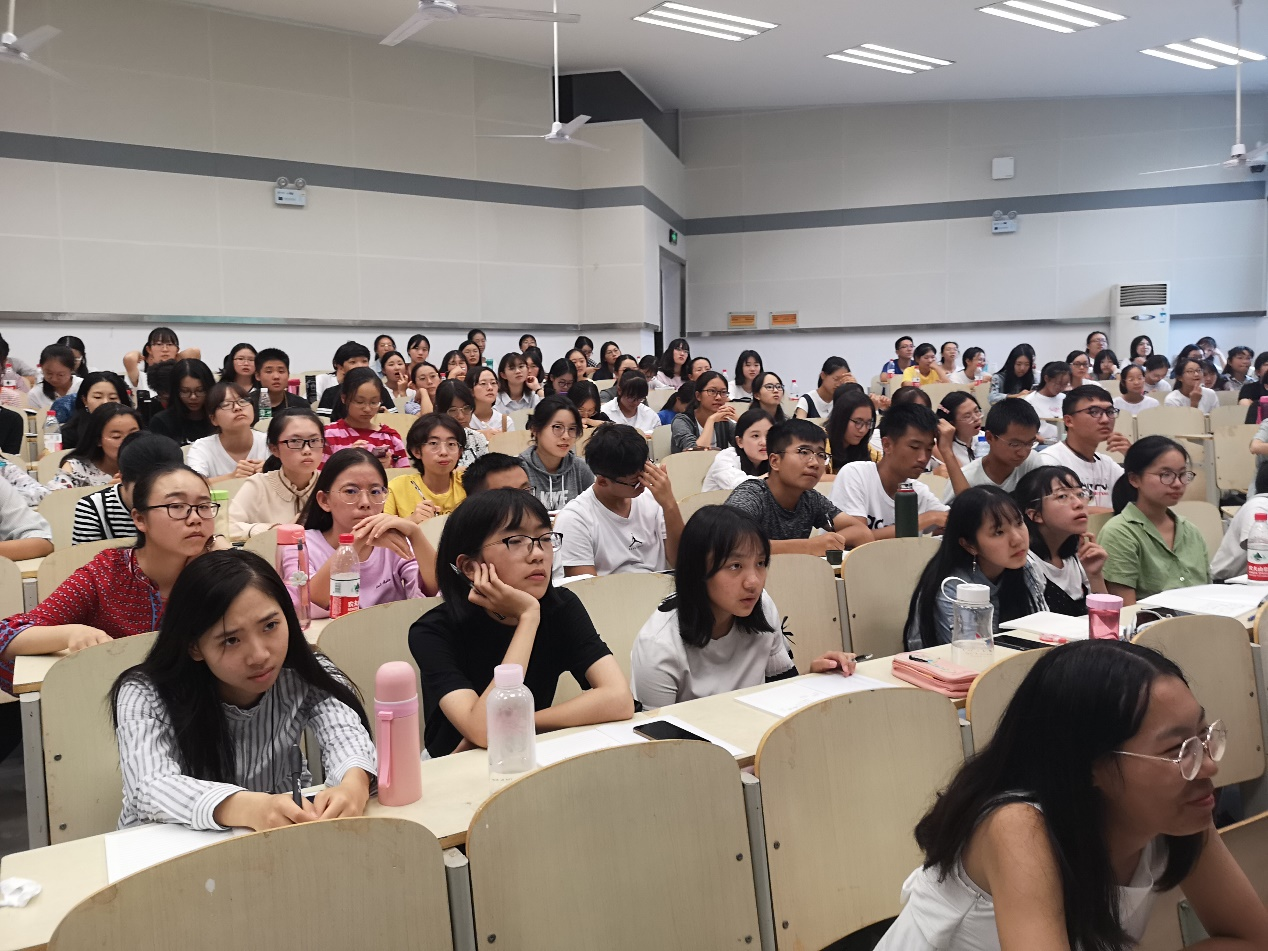On the afternoon of September 10, the first Guided Reading Course on World Literature began. The course consisted of eleven lectures, which were delivered by eight teachers with experience from a variety of majors. Through these insightful lectures, they aimed to give students an in-depth understanding of thirteen prominent works in world literature.
The first lecture was given by Professor Wang Aiju on “Love and Class in Pride and Prejudice”. Professor Wang’s interpretation of Pride and Prejudice was unique and interesting, and helped students understand the multifaceted and intricate theme of class and love in the book.
Professor Wang is currently the Associate Dean of School of Foreign Languages and Literature at Wuhan University. She has been engaged in teaching and research of English literature for a long time, and has published 12 papers in journals including Foreign Literature Studies and Contemporary Foreign Literature. Her background in the academic field was an astute addition to the structuring of the course as it provided the students an enriched learning opportunity.

Professor Wang Aiju introducing character relationships in Pride and Prejudice

Full classroom for the class Guided Reading Course
Knowing People and Discussing the World
The class deals with a complex comprehension of the world and a reflection on life. This was done by introducing the relationship between the author and her work. The “people” in “Knowing People and Discussing the World” refers to the writer, his family and the people around him, while “the world” refers to the historical context and social history of the author’s time period. Professor Wang used the examples of the An-Shi rebellion and Du Fu to illustrate the extensive influence of historical background on individual works. Moreover, she used Austen’s birth and death dates as historical coordinates, and elaborated on how world events that happened during the creation of Pride and Prejudice and Austen’s personal experiences influenced her work. Additionally, Professor Wang also talked about the plot of “Cinderella” in classic love stories and compared it with the popular TV drama Story of Yanxi Palace.
General Thematic Analysis: Love, Marriage, and Class
Eighteenth and nineteenth century England was a typical class-based society. As a result, Pride and Prejudice was written according to these constraints. Hence, love and class are intertwined. At the end of the novel, love broke through the oppressive boundaries of class. This ultimately reflects the greatness of human nature. Elizabeth and Darcy, from the gentry and the nobility respectively, were at first prejudiced against each other’s social class. Furthermore, as the plot unraveled, their misunderstanding deepened. However, the power of love finally made them abandon their class prejudice, and reconcile their differences. This resulted in a beautiful marriage between them.
Professor Wang compared the main protagonist Elizabeth and other female characters in the novel, and analyzed the similarities and differences between them. These fully affirmed Elizabeth’s ability to judge one’s character independently from class. This is ultimately why Elizabeth eventually got Darcy’s respect and love. Professor Wang also interpreted love according to the details of the text. She believed that love should be spiritually compatible and reciprocal, similarly to the events that occur in The Little Prince. Hence, a good marriage should be the result of the combination of emotions and reason.
Universal Thematic Analysis: Self-knowledge
Self-knowledge and awareness are the common themes in the novels. The Legends of the Condor Heroes and Journey to the West are good examples. As a classic love story, Pride and Prejudice explores not only the theme of marriage, but also the theme of self-knowledge. The novel can be roughly divided into three parts, with the first part describing various balls, the middle describing character’s trips, including Elizabeth’s trips to Hunsford, Rosings, and Pemberley, and the final part focusing on Elizabeth’s self-reflection and growth.

Captivated and attentive students
Students’ Responses
“Beginning with the storyline of Pride and Prejudice, Professor Wang leads us in a discussion of the importance of marriage and family for women in Austen’s time. Although the story of the book seems to be ‘cliché’ today, it has become a classic with its excellent mold of certain characters’ images. At the end, Professor Wang sublimated the whole topic to ‘Know thyself’, giving us an opportunity to think about ourselves who are at an important turning point in our lives. This class explores the issues of love and marriage, literature and the times, and gives us a deep impression of the author’s understanding of life.”
“What impressed me the most during the session was Professor Wang’s explanation of the settings and characters. In Pride and Prejudice, the class differences between the main characters and their families are not only evident in the way they speak, but also in the descriptions of their homes. In terms of the characters’ setting, there is a clear contrast between Elizabeth and others, which indicates Elizabeth’s characteristic as an active subject to choose who she loves.”
Edited by Yin Xiaoxue and Hu Sijia
(a winning entry from "Impressive Luojia: the first graphic and English text collection activity of WHU")